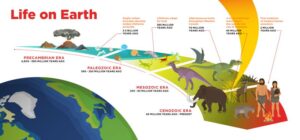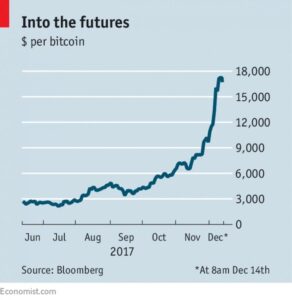 Epistemology is the study of what we know and how we know it. Previously, it may have been considered an abstract philosophical line of inquiry. Now, in 2018, partisans in the United States are divided over many issues including whether or not to believe what scientists say, what journalists report, what the President tweets, and more. Is science something you “believe” in? Is global warming caused by “science-based” reasons or by an unknowable all-powerful entity beyond rational comprehension? In addition to helping inform urgent political issues, epistemology can help with vexing philosophical riddles such as what place do humans have on Earth? Are we rulers who can and should reap natural resources for our own benefit as we strive to be fruitful and multiply? Or are we stewards whose purpose is to ensure that the multitudes of species that made it through the 20th century can survive the coming Sixth Mass Extinction in the 21st?
Epistemology is the study of what we know and how we know it. Previously, it may have been considered an abstract philosophical line of inquiry. Now, in 2018, partisans in the United States are divided over many issues including whether or not to believe what scientists say, what journalists report, what the President tweets, and more. Is science something you “believe” in? Is global warming caused by “science-based” reasons or by an unknowable all-powerful entity beyond rational comprehension? In addition to helping inform urgent political issues, epistemology can help with vexing philosophical riddles such as what place do humans have on Earth? Are we rulers who can and should reap natural resources for our own benefit as we strive to be fruitful and multiply? Or are we stewards whose purpose is to ensure that the multitudes of species that made it through the 20th century can survive the coming Sixth Mass Extinction in the 21st?
Let’s start with what we know:
The scientific method consists of competing theories that can be tested, reviewed based on empirical, observed evidence, repeated, and confirmed with peer review. This produces verifiable knowledge. Here are some examples:
The Earth, sun, and solar system are an estimated 4.6 billion years old. The first fossils have been estimated to be 3.5 billion years old. Then, there is evidence that a lot of time and evolution occurred until an explosion of multi-cellular life (the Cambrian explosion) about 541 million years ago, followed by the age of the dinosaurs, from 225 million years to 66 million years ago. The earliest rat-like mammals, from which we evolved, also developed during that time. After an asteroid impacted in the Gulf of Mexico and caused global changes that wiped out the dinosaurs, small mammals survived and diversified into whales, zebras, monkeys, and even….humans. Our ancient ancestors made a gradual transition from more ape-like to more recognizably-human (but not yet modern human) about 2 million years ago. Around 250 thousand years ago, anatomically modern humans lived in West Africa, and 50 thousand years ago they began migrating around the world. Pre-literate cave paintings have been found from 32,000 years ago. The last Ice Age ended about 10,000 years ago, and humans began cultivated agriculture a few thousand years later.
Is that all just a theory? It may be refined over time as new fossils are discovered. But the general outlines are pretty well documented and proven. It is not fake news. It can inform your understanding of humanity’s place in the world, and develop an ethical perspective that values non-human life on Earth.
What about that other scientific topic in the news: climate change? Here’s what we know. Carbon dioxide traps heat in the atmosphere, like a blanket over the Earth. It is emitted as a byproduct of fossil fuel combustion and deforestation. Humans are currently using more fossil fuels (which were only discovered a few hundred years ago) than ever before and cutting down more trees than ever before in human history. And there are more humans on Earth than ever before, and the number is expected to keep rising, toward 10 billion people around 2050. Due to this human impact, the planet’s average surface temperature has already risen about 2.0 degrees Fahrenheit (1.1 degrees Celsius) since the late 19th century. Most of the warming occurred in the past 35 years, with 16 of the 17 warmest years on record occurring since 2001. Glaciers are retreating all over the world.
Global sea level rose about 8 inches in the last century and the rate is increasing. It is now projected to rise 2-3 feet by 2100 (did that get your attention, Florida? Or anyone living near sea-level?). The number of extreme weather events is increasing (see headlines from 2017). This is in line with scientists’ models based on historical climate data. Scientists extrapolating that historical record into the future have revealed the potential for:
-
More and more hurricanes, heat waves, desertification, and extreme weather, displacing people, and causing human and economic misery
-
Mass extinctions of many species on the planet at a rate rivalling the top 5 global extinction events
-
Agricultural systems collapse leading to global food shortages
-
Climate refugees and mass migrations, which in the context of the current refugee crisis, could result in more authoritarian political reactions, destabilizing democratic governments around the world (see headlines from 2016 and 2017 in the U.S. and E.U.)
So that is what we know, based on the scientific method. Here are a few things we don’t actually know, but are prevalent in the media and society in many parts of the U.S.:
-
Santa Claus
-
The Easter Bunny
-
The first woman was made from a rib from the first man
-
Climate change is not a problem because an invisible spirit has a secret plan for the global climate even if carbon dioxide was never mentioned in a book of scripture written over 2,000 years ago
This is not meant to diminish the Bible as a book of interesting poetry, stories, and metaphors, with allegorical lessons for moral behavior. But it is meant to show that, epistemologically, Faith-based approaches to Creation are not the same as science-based, evidence-based approaches. Faith-based knowledge is derived from what religious parents told their children when they were young, or based on books written by unscientific people thousands of years ago. Some people are able to hold both views simultaneously. For others raised in religious households, breaking free of that worldview and adopting a scientific perspective may require a rebellion against parental authority and even an acceptance of tribal punishment (excommunication or shunning). It will not be easy, but if the outcome is saving the climate, civilization, democracy, and millions of species, it may be worth it.
A first step in elevating a humanist approach may be to counter myths (society’s fake news) based on what cognitive scientist George Lakoff calls the Strict Father Morality with with the “Nurturant Parent” approach, for example:
-
Helping people actually helps them.
-
The Bible is a nice book, but it is not a science textbook.
-
The Invisible Hand of the “free market” (see the financial crisis of 2008) needs guidance and direction from civil society based on our shared values.
-
Rich people are just people who happened to have rich parents and bank accounts in the Cayman Islands, and they need to pay their fair share.
It can be a difficult dose of humility to accept that humanity is just one species of millions, and that we were not created in God’s image as the center of all creation. Not only that, but after being demoted, humanity now has the obligation to rise up and take control of the Anthropocene by making sure the global climate is sustainable. Perhaps 2018 will be the year where epistemology – the study of actual knowledge, not myths – can help save the planet.





